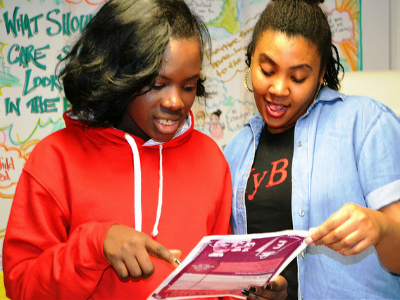
By Annie Hudson, Chief executive of The College of Social Work
On Friday, I was privileged to be invited to take part in a Channel 4 news special which aimed to shine a light on the experiences of young people in today’s care system. It was a privilege precisely because the debate was led by young people themselves: an audience assembled in the symbolic surroundings of the Ragged School Museum in east London to quiz a panel including myself, Conservative MP and education select committee chair Graham Stuart, and the acclaimed author Lemn Sissay – who was himself in care as a child. We were all struck, but not surprised, by the energy and articulacy of the young people taking part. Over the weekend, I have been reflecting on their stories and some of the key themes of the programme’s discussion.
Firstly, we must think more about social work’s role in tackling the poor public perception of children in care. The negative effects resulting from the stigma of being or having been in care were a strong feature of what young people felt was wrong, and many gave powerful examples of the labelling that can be so damaging to their lives. Children and young people who have experienced care very often develop resilience and strengths which can be (and are) used with great effect in their adult lives, despite the tendency of wider society to ‘write them off’. As a young audience member, Jason, asked on Friday: “why should it mean I am worth any less?”
Secondly, it was clear once again that excellent social work practice and successful public policy must better understand the impacts of care on different groups of children. We know, for example, that outcomes tend to be poorer when a young person first enters care in their teens, particularly in relation to educational attainment. We therefore need better knowledge about the specific interventions and approaches that will better ensure children and young people get the right support at the right time. The stakes are exceedingly high – last week’s National Audit Office (NAO) report tells us that just 15 per cent of children in care gain 5 good GCSEs, compared to 58 per cent of children in the general population.
Another clear but familiar theme that came up was the importance of stability. One of the young people taking part in the programme had been in 30 placements over the course of just three years. This is simply unacceptable. Relationships are the golden thread of children and young people’s care experiences. It may seem like common sense but social workers must have the time, confidence and expertise to engage meaningfully with children. Workload pressures undoubtedly make this difficult. However, developments to bring back relationship-based social work must be welcomed for placing relationship-based practice centre stage.
Finally, the debate touched on the influence of “the system” more widely and the role of health, schools, the police and central government. A young woman called Poppy said: “you can point the finger at social workers all you like, but what about government decisions on jobs and housing benefit too?”
The challenges young people face are many; we all have a responsibility to listen and respond to the strong voice of young people who are the “experts by experience” of what care means.


 Bournemouth, Christchurch and Poole
Bournemouth, Christchurch and Poole  Hampshire County Council
Hampshire County Council  Lincolnshire County Council
Lincolnshire County Council  Norfolk County Council
Norfolk County Council  Northamptonshire Children’s Trust
Northamptonshire Children’s Trust  South Gloucestershire Council
South Gloucestershire Council  Wiltshire Council
Wiltshire Council  Wokingham Borough Council
Wokingham Borough Council  Children and young people with SEND are ‘valued and prioritised’ in Wiltshire, find inspectors
Children and young people with SEND are ‘valued and prioritised’ in Wiltshire, find inspectors  How specialist refugee teams benefit young people and social workers
How specialist refugee teams benefit young people and social workers  Podcast: returning to social work after becoming a first-time parent
Podcast: returning to social work after becoming a first-time parent  Podcast: would you work for an inadequate-rated service?
Podcast: would you work for an inadequate-rated service?  Family help: one local authority’s experience of the model
Family help: one local authority’s experience of the model  Workforce Insights – showcasing a selection of the sector’s top recruiters
Workforce Insights – showcasing a selection of the sector’s top recruiters 

 Facebook
Facebook X
X LinkedIn
LinkedIn Instagram
Instagram
Comments are closed.